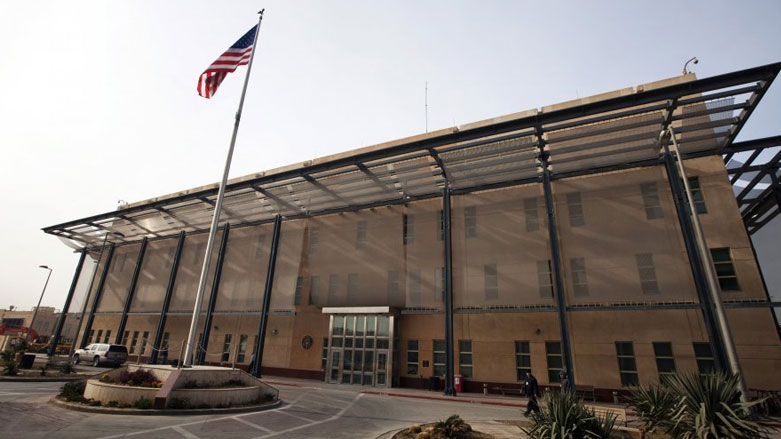Second meeting in US-Iraq Strategic Dialogue this summer

WASHINGTON DC (Kurdistan 24) – Washington expects to hold a second session of the US-Iraq Strategic Dialogue later in the summer.
The first session of the dialogue was held in June by videoconference due to the coronavirus pandemic. Following that meeting, the US and Iraq issued a joint statement that said, “a Strategic Dialogue Higher Coordination Committee” would meet in Washington DC, “likely in July.”
Read More: US-Iraq strategic dialogue to resume this summer
The month of July, however, is almost over, and a State Department spokesperson, asked on Tuesday by Kurdistan 24 about the status of that dialogue, responded, “We are in contact with our Iraqi partners about a follow-up meeting.”
The meeting would be “in person, here in Washington DC at some point this summer,” she explained.
She also expressed US satisfaction with the earlier meeting. “We were very pleased with our virtual Strategic Dialogue session with Iraq,” she said. “The Dialogue encompassed the broad range of our mutual interests, including our economic, security, political, and cultural partnership.”
“This is in keeping with previous discussions based on our 2008 Strategic Framework Agreement,” she added.
2008: Strategic Framework Agreement and SOFA Agreement
The Strategic Framework Agreement was concluded in December 2008, between the outgoing administration of President George W. Bush and the Iraqi government, headed by Prime Minister Nouri al-Maliki.
At the same time, a Security Agreement, or Status of Forces Agreement (SOFA), was concluded regulating the US military presence in Iraq. It called for US troops to withdraw from Iraqi cities by June 2009 and to withdraw from Iraq in its entirety by December 2011.
Shortly after Operation Iraqi Freedom (OIF) began in March 2003, the US was quick to conclude it had won and actually withdrew its most senior officers from Iraq in the summer of 2003 to plan further Middle East wars, as Lt. Gen. Daniel Bolger (US Army, Retired) explains in his memoir, Why We Lost.
The hasty US conclusion that it had won in Iraq was, of course, quite wrong, as those whom the US had ousted from power, joined forces with Islamic extremists to fight an insurgency against the new Iraqi government and the US-led coalition.
In January 2007, determined not to lose in Iraq, Bush ordered a “surge” in US forces, while Gen. David Petraeus was appointed commander of the coalition and shifted to a counter-insurgency strategy. By the end of 2011, it appeared the insurgents had been largely defeated.
The new president, Barack Obama, had campaigned in the 2008 elections and he withdrew US forces from Iraq then.
Yet just three years later, in 2014, the insurgency reappeared with a vengeance, as the so-called Islamic State was established in Syria in the midst of that country’s civil war and then exploded into Iraq, capturing nearly a third of the country.
Obama was obliged to send US forces back to Iraq, where, at the head of a large, international coalition, they worked with Iraqi and Kurdish forces to defeat the Islamic State territorially.
That experience has left many US officials convinced that Washington should not radically cut off military ties with Baghdad again, as it did in 2011, lest the country fall back into the hands of Sunni insurgents, on the one hand, or Iranian-backed armed groups, on the other.
Mustafa al-Kadhimi visits Iran
On Tuesday, Iraq’s new prime minister, Mustafa al-Kadhimi, made his first official visit as prime minister outside of Iraq—to Iran.
“The Iraqi people want distinguished relations with the Islamic Republic of Iran, based on each country’s specific circumstances and on the principle of non-interference in internal affairs,” Kadhimi said in Tehran.
“Iraq’s foreign relations are guided by the principles of balance and of avoiding any axis, and for this reason, Iraq will not allow its territories to be used to threaten Iran,” he added.
Read More: In first trip abroad as Iraqi PM, Kadhimi meets top officials in Tehran
But it had not been Kadhimi’s intent that Tehran be the site of his first trip abroad as prime minister. It was supposed to be Iran’s regional arch-rival and America’s close ally, Saudi Arabia.
Asked about Kadhimi’s visit to Iran, the State Department spokesperson told Kurdistan 24, “We note that on July 18, Prime Minister Kadhimi’s government confirmed his first trip abroad would be to Saudi Arabia.”
However, as the Saudi Press Agency announced on Monday, the Kingdom’s 84-year-old ruler, King Salman, was admitted to hospital, for what it said was a gall bladder inflammation.
“King Salman’s admission to the hospital forced a postponement” of Kadhimi’s visit, the spokesperson noted, as she added, “We wish King Salman a speedy recovery and encourage both parties to agree on a new date for a visit as soon as possible.”
Editing by Karzan Sulaivany
